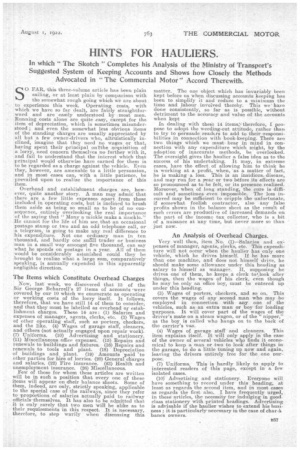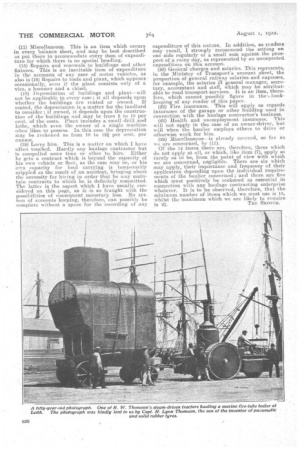HINTS FOR HAULIERS.
Page 21

Page 22

If you've noticed an error in this article please click here to report it so we can fix it.
In which" The Skotch " Completes his Analysis of the Ministry of Transport's Suggested System of Keeping Accounts and Shows how Closely the Methods Advocated in "The Commercial Motor" Accord Therewith.
SO FAR, this three-volume article has beau plain sailing, or at least plain by comparison with
. the somewhat rough going which we are about to experience this week. Operating costs, with which we have so far dealt, are fairly straightforward and are easily understood by most men. Running costs alone are quite .easy, except for the item of depreciation, which is sometimes misunderstood; and even the somewhat less obvious items of the standing charges are usually appreciated by all but a few owner-drivers who, altruistically inclined, imagine that they need no wages or that, having spent their principal o.n4the acquisition of a lorry, need concern themselves no further with it, and fail to understand that the interest which that principal would otherwise have earned for them is to be regarded as a charge against the vehiele. Even they, however, are amenable to a little persuasion, and in most eases can, with a little patience, be prevailed upon to realize the importance of this item. .
' Overhead and establishment charges are, however, quite another story. A man may 'admit e that there are a few little expenses apart from those included in operating costs, but is inclined to brush them aside as being so small as to be of no consequence, entirely overlooking the real importance 'of the saying that " Mony a anickle maks a muckle." He cannot for the life of hira see, that an occasional postage stamp or two and an odd telephone call, or a telegram,. is going to make any real difference to his expenditure. Not one ordinary man in ten thousand, and hardly one sea trader or business man in a small way amongst five thousand, can say what he spends on postage in a year. All of them would be considerably astonished could they be brought to realize what a large sum, comparatively speaking, is annually expended in this apparently
negligible direction. .
The Items which Constitute Overhead Charges
Now, last week, we discovered that 13 of the Sir George Beharrell's 27 items of accounts were covered by our 10 which we enumerate as operating or working costs of the lorry itself. It. follows, therefore, that we have still 14 of them to consider, and that they must be labelled as overhead or establishment charges. These 14 are: (1) Salaries and expenses of manager, agents, clerks, etc. (3) Wages of other operating staff, such as porters, checkers, and the like. (4) Wages of garage staff, cleaners, and Others (not actually engaged upon repair work). (7) Uniforms. (10) Advertising and stationery. (11) Miscellaneous office expenses. (15) Repairs and renewals to buildings and fixtures. (16) Repairs and renewals to tools and plant. (18) Depreciation of buildings and plant. (19) Amounts 'paid to other parties for hire of lorries. (20) General charges and salaries. (22) Fire insurance. (23) Health and unemployment insurance. (26) Miscellaneous.
Few of those for whom these articles are written will be in such a position that every one of these items will appear on ?L'heir balance sheets. Some of them, indeed, are only, strictly speaking, applicable to the special case of the railways, since they refer to proportions of salaries actually paid to railway officialsAllemselves. It has also to be admitted that it is only rarely that two men will be alike as to their requirements in this respect. It is necessary, therefore, to step warily when discussing this
matter. The one object which has invariably been kept before us when discussing accounts keeping has been to simplify it and reduce to a minimum the time and labour involved thereby. This we have done consistently, so far as is possible, without detriment to the accuracy and value of the accounts when kept
Ir, dealing with these 14 items;qherefore, f propose to adopt the weeding-out attitude, rather than to try to persuade readers to add to their responsibilities in connection with book-keeping. There are two things which we must bear in mind in connection with any expenditure which might, by the adoption of inaccurate methods, be overlooked. The oversight gives the haulier a false idea as to the success of his undertaking. It may, in extreme cases, have the effect. of allowing him to think he is working at a profit, when, as a matter of fact, he is making a loss. This is an insidious, disease, and may run for a year or two before its effects are so pronounced as to be felt, or its presence realized. Moreover, when of long standing, the cure is difficult and sometimes even impossible. The loss incurred may be sufficient to cripple the unfortunate, if somewhat foolish contractor, also any false profits shown in the balance sheet as the result of such errors are productive of increased demands on the part of the income tax collector, who is a bit of a nuisance at any time, but never more so than just now.
An Analysis of Overhead Charges.
Very well then, item No. (1)—Salaries and ex.penses of manager, agents, clerks, etc. This expenditure will not occur when the haulier has only one vehicle, which he drives himself. If he has more than one machine, and does not himself drive, he should make some allowance under this heading as salary to himself as manager. If, supposing he drives on of them, he keeps a clerk toelook after things, then the wages of his clerk, even though he may be only an office boy, must be entered up under this heading.
(3) Wages of porters, checkers, and so on. This covers the wages of any second man who may be employed in connection with any one of the vehicles, such as an extra man or boy for loading purposes. It will cover part of the wages of the driver's mate on a steam wagon, or of the 'nipper," as the boy is called who hangs on to the hack of the carrier's van, (4) Wages of garage staff and cleaners. This item explains itself. It will only apply in the case of the owner of several vehicles who finds it economical to keep a man or two to look after things in the garage, to do a little tuning up now and again, leaving the drivers entirely free for the one purpose. (7) Uniforms. This is hardly likely to apply to interested readers of this page, except in a few isolated cases.
(10) Advertising and stationery. Everyone will have something to record under this heading, at least as regards the second item, and in most eases as regards the first also. I have frequently urged, in these articles, the necessity for indulging in good. class stationery with printed headings. Advertising is advisable if the haulier wishes to extend his business ; it is particularly necessary in the case of char-a banes owners. (11) Miscellaneous. This is an item which occurs in every balance sheet, and may be best described as put there to accommodate every item of expenditure for which there is no special heading.
(15) Repairs and renewals to buildings and other -fixtures. This is an inevitable item of expenditure in the accounts of any user of motor vehicles, as also is (16) Repairs to tools and plant, which appears occasionally, even if the plant consists only of a -vice, a hammer and a chisel.
(18) Depreciation of buildings and plant—will not be applicable in every case ; it all depends upon whether the buildings are rented or owned. If rented, the depreciation is a matter for the landlord to consider ; if owned, it depends upon the construction of the buildings and may be from 5 to 10 per cent, of the costs. Plant includes a small drill and lathe, which even the owner of a single machine often likes to possess. In this case the depreciation may be reckoned as from 10 to 12f per cent, per annum..
(18) Lorry hire. This is a matter on which I have often touched. Hardly any haulage contractor but is compelled some time or other to hire. Either he gets a contract which is beyond the capacity of his own vehicle or fleet, as the case may be, or his own capacity for load carrying is temporarily crippled as the result of an accident, bringing about the necessity for hiring in order that he may maintain contracts to 'which he is definitely committed. The latter is the aspect which I have usually considered on this page, as it is so fraught with the possibilities of consequent monetary loss. No system of accounts keeping, therefore, can possibly be complete without a space for the-recording of any expenditure of this nature. In addition, as readers may recall, I strongly recommend the setting on one side regularly of a small sum against the prospect of a rainy day, as represented by an unexpected expenditure on this account. (20) General 'charges and salaries. This represents, in the Ministry of Transport's account sheet, the proportion of general railway salaries and expenses, for example, the salaries -al general manager, secretary, accountant and staff, which may be attributable to road transport services. It is an item, therefore, which cannot possibly figure in the-,hookkeeping of any reader of this paper. (22) Fire insurance. This will apply. as regards insurance of the garage or other building used in connection with the haulage contractor's business.
(23) Health and unemployment insurance. This will not apply in the case of an owner-driver, but will when the haulier employs others to drive or otherwise work for him.
(20) Miscellaneous—is already covered, so far as we are concerned, by (11).
Of the 14 items there are, therefore, three which do not apply at all, or which, like item (7), apply so rarely as to be, from the point qf view with wiiich we are concerned, negligible. There are six which may apply, their importance and frequency of their application depending upon the individual requirements of the haulier concerned; and there are five which must positively be reckoned as essential in connection with any haulage contracting enterprise whateyer. It is to be observed, therefore, that the minimum number of items which We mast use is 15, whilst the maximum which we are likely to require is 21. THE STMTCH.






























